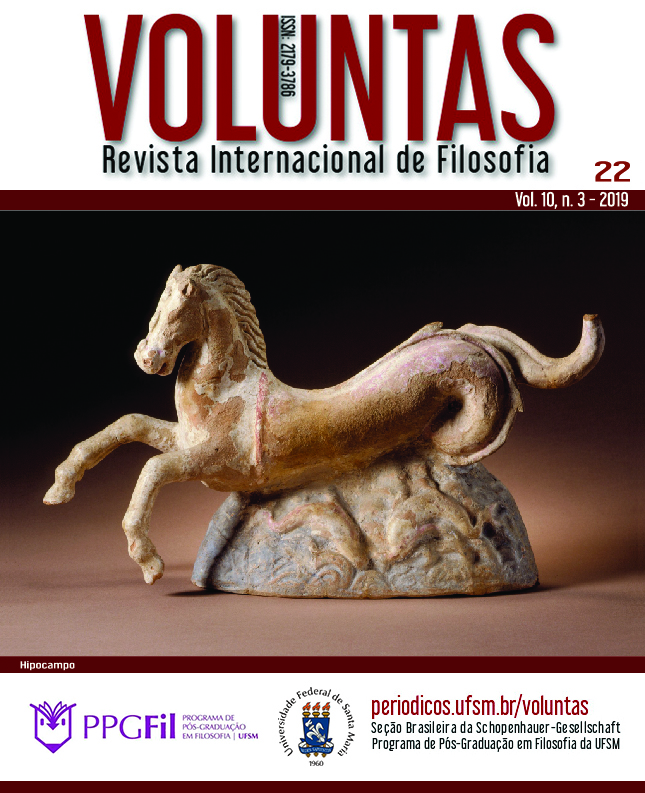Erros de memória e erros de (teorias da) memória
DOI:
https://doi.org/10.5902/2179378639787Palavras-chave:
Memória episódica, Falsas Lembranças, Confabulação.Resumo
Nesse artigo, investigo três casos de erros de memória obtidos em laboratório como forma de avaliar as principais teorias da memória (declarativa): teoria causal e simulacionismo. De maneira geral, a teoria causal afirma que alguém lembra de algo somente se sua lembrança está numa relação causal adequada com uma experiência anterior daquilo que é lembrado. No simulacionismo, essa relação não é necessária. Os casos de erros de memória investigados são DRM, “perdido no shopping” e erro de conjunção de conteúdo. Esses casos são difíceis para a teoria causal, especialmente em sua versão direta, mas não para o simulacionismo. Minha hipótese é a de que essa dificuldade se deve especificamente ao critério causal adotado.
Downloads
Referências
BERNECKER, S. The Metaphysics of Memory. Springer, 2008.
BERNECKER, S. Memory: A Philosophical Study. Oxford: Oxford University Press, 2010
BERNECKER, S. A Causal Theory of Mnemonic Confabulation. Frontiers in Psychology, 8, 1207, 2017.
BERRIOS, G. Confabulations: A Conceptual History. Journal of the History of the Neurosciences, 7(3), 225-241, 1998.
BROWN, E., DEFFENBACHER, K., & STURGILL, W. Memory for faces and the circumstances of encounter. Journal of Applied Psychology, 62 (3), 311–318, 1977.
DALLA BARBA, G. Memory, Consciousness and Temporality (Neurobiological Foundation of Aberrant Behaviors). Springer, 2002.
DANTAS, D. Memória Incerta: Lembranças, Falsas Lembranças e as Ciências da Memória (dissertação de mestrado, Universidade Federal do Rio Grande do Sul), 2010.
DEESE, J. On the Prediction of Occurrence of Certain Verbal Intrusions in Free Recall. Journal of Experimental Psychology, 58, 17-22, 1959.
EVANS, G. The Varieties of Reference. Oxford: Oxford University Press, 1982.
JOHNSON, M., FOLEY, M. & LEACH, K. The Consequences for Memory of Imagining in another Person's Voice. Memory & Cognition, 16(4), 337-342, 1988.
JOHNSON, M., HASHTROUDI, S. & LINDSAY, D. Source Monitoring. Psychological Bulletin, 114(1), 3-28, 1993.
JOHNSON, M., RAYE, C., WANG, A. & TAYLOR, T. Fact and Fantasy: The Roles of Accuracy and Variability Em Confusing Imaginations with Perceptual Experiences. Journal of Experimental Psychology: Human Learning and Memory, 5(3), 229-240, 1979.
KRIPKE, S. Naming and Necessity. Cambridge, MA: Harvard University Press, 1980.
LEVINE, L. Reconstructing Memory for Emotions. Journal of Experimental Psychology: General, 126(2), 165-177, 1997.
LEWIS, D. Counterfactuals, Oxford: Blackwell, 1973.
LEWIS, D. Counterfactual Dependence and Time’s Arrow, Noûs, 13(4): 455-476, 1979.
LOFTUS, E. & PICKRELL, J. The Formation of False Memories. Psychiatric Annals, 25(12), 720-725, 1995
Loftus, E., Coan, J., & Pickrell, J. Manufacturing False Memories Using Bits of Reality. In: REDER, L. (Ed.), Implicit memory and metacognition. Psychology Press, 1996, p. 195-220.
MALCOLM, N. Memory and Mind. Cornell University Press, 1977.
MARTIN, C. & DEUTSCHER, M. Remembering. Philosophical Review, 75, 161-96, 1966.
MICHAELIAN, K. Confabulating, Misremembering, Relearning: The Simulation Theory of Memory and Unsuccessful Remembering. Frontiers in Psychology, 7, 1857, 2016a.
MICHAELIAN, K. Mental Time Travel: Episodic Memory and Our Knowledge of the Personal Past. Cambridge, MA: MIT Press, 2016b.
PEARL, J., GLYMOUR, M. & JEWEL, N. Causal Inference in Statistics: A Primer. London: John Wiley & Sons, 2016.
Rebello, J. Elementos para uma Análise do Recordar. In: FONSECA, A., POHLMANN, E. & GOLDMEIER, G. (Eds.). Ética, Política e Esclarecimento Público: Ensaios em Homenagem a Nelson Boeira. Editora Bestiário, 2012.
REICHENBACH, H. The Direction of Time. Berkeley: University of California Press, 1956.
REINITZ, M., LAMMERS, W. & COCHRAN, A. Memory-Conjunction Errors: Miscombination of Stored Stimulus Features Can Produce Illusions of Memory. Memory & Cognition, 20(1), 1-11, 1992.
ROBINS, S. Misremembering. Philosophical Psychology, 29(3), 432-447, 2016.
ROBINS, S. Mnemonic Confabulation. Topoi. Disponível em: https://doi.org/10.1007/s11245-018-9613-x, 2018. Acesso em: 22 nov. 2019.
ROEDIGER, H. & MCDERMOTT, K. Creating False Memories: Remembering Words Not Presented in Lists. Journal of Experimental Psychology: Learning, Memory, and Cognition, 21, 803-814, 1995.
SCHACTER, D. & ADDIS, D. The Ghosts of Past and Future: A Memory That Works by Piecing Together Bits of The Past May Be Better Suited to Simulating Future Events Than One That Is A Store of Perfect Records. Nature, 445(7123), 27, 2007.
TULVING, E. Episodic Memory: From Mind to Brain. Annu Rev Psychology, 53, 1-25, 2002.
WHITEHEAD, A. & RUSSELL, B. Principia Mathematica. Cambridge: Cambridge University Press, 1910.
Publicado
Como Citar
Edição
Seção
Licença
A submissão de originais para este periódico implica na transferência, pelos autores, dos direitos de publicação impressa e digital. Os direitos autorais para os artigos publicados são do autor, com direitos do periódico sobre a primeira publicação. Os autores somente poderão utilizar os mesmos resultados em outras publicações indicando claramente este periódico como o meio da publicação original.
A Voluntas é um periódico de acesso aberto sob a licença Creative Commons Atribuição-NãoComercial-CompartilhaIgual 4.0 Internacional (CC BY-NC-SA 4.0).






